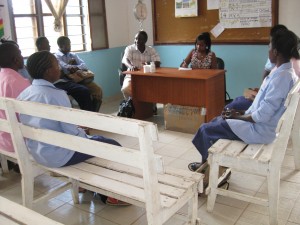Achieving universal health coverage: CHWs are at the root of the solution, new study shows

An exciting recent publication from the Johns Hopkins Bloomberg School of Public Health builds on the momentum from 2013 around Community Health Workers (CHWs) and their vital role in the movement towards primary health care and achieving the health-related Millennium Development Goals (MDGs). The article — “Community Health Workers in Low-, Middle-, and High-Income Countries: An Overview of Their History, Recent Evolution, and Current Effectiveness,” by Henry Perry, Rose Zullinger, and Michael Rogers — was a powerful highlight of this year’s Annual Review of Public Health.
Perry, et al. trace the history of CHWs from their origins in early twentieth century China as “barefoot doctors.” Since then, the growth of CHWs can be attributed to increased understanding of the barriers to accessing health care that many populations face. In addition, the importance of a multi-layered health system has become enshrined in the global health community. In 1978, the Declaration of Alma-Ata called for universal health coverage by the year 2000, stating that:
“Primary health care… relies, at local and referral levels, on health workers, including physicians, nurses, midwives, auxiliaries and community workers as applicable, as well as traditional practitioners as needed, suitably trained socially and technically to work as a health team and to respond to the expressed health needs of the community.”
Significantly, the authors argue that CHWs are not merely a Band-Aid in countries with gaps in their primary health care workforces, but instead should be an integrated part of a country’s health system. For instance, there are already as many as 120,000 CHWs in the United States, and their work is just as important in developed countries with large internal inequality as in less developed countries.
The authors recognize a series of CHW programs that have been particularly successful, from the ‘community health agents’ in Brazil’s Family Health Service to Pakistan’s Lady Health Worker Program. They also describe the impact of CHWs in confronting major health issues, ranging from child mortality and HIV/AIDS to malaria and even cancer, as well as the important yet difficult step of assessing the effectiveness of CHW programs.
Finally, the article commends the One Million Community Health Worker (1mCHW) Campaign for working with countries to solve the question of “how large-scale CHW programs can become as effective as possible in improving the health of the populations they serve.” Overcoming this challenge will be the key to achieving universal health coverage in this decade!

1 Comment
Ahmad Baba
This is a good campaign towards achieving universal access to healthcare and closing the health disparities in the world.
There are few available “experts” in the communities especially in middle and low income regions of the world to provide the needed healthcare services to the populace. Also, inadequate and insufficient availability of infrastructure, funding, equipment and technology to deliver on the health needs especially of the vulnerable groups (hidden communities) have been a hinderance to access desirable qualitative healthcare packages.
With this initiative (1mCHW) of involving the communities through the focus on community health workers its most likely the way to go in making the communities more responsible and functional to their health and other developmental needs. As cited in the article, a successful Primary Health Care system requires team effort (“Primary health care… relies, at local and referral levels, on health workers, including physicians, nurses, midwives, auxiliaries and community workers as applicable, as well as traditional practitioners as needed, suitably trained socially and technically to work as a health team and to respond to the expressed health needs of the community”) which has to be community specific and controlled therefore the role of the community health workers becomes key. This is so because they are from and belong to the community, they live and work there so it is just natural that they have requisite local knowledge and understanding of the social capital needed for progress in the community. Their role should be more than just mobilisation and participation in externally generated healthcare projects and interventions in their communities to more strategic actions such as identification and prioritising community issues, planning and implementation, to monitoring and evaluation of community specific needs. Their strategic involvement through the whole processes would be relevant in building ownership with sustainable mechanisms and structures within these communities.
I believe the community health workers if well deployed could form the fulcrum of having communities being actively involved and owning the healthcare development programmes through supports in improving community organisation and capacity in problem solving.
This system of having experts come to direct how interventions should be implemented and just requiring the communities to accept and use the community health workers as foot soldiers has obviously not worked in attainment of the desirable universal access to health coverage. However, there are documented evidences from low and middle income communities that shows that the more involved the communities are in being in-charge of their health interventions the more significant successes are recorded with such interventions. These have been seen in the control of onchocerciasis, malaria, malnutrition, HIV/AIDS, polio with the community directed programmes.
The One Million Community Health Workers Campaign if encouraged and properly deployed will obviously become an important platform for achieving significant universal access coverage in the world. I support this campaign!